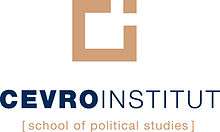CEVRO Institute
| CEVRO Institut | |
 | |
| Type | Private |
|---|---|
| Established | 2005 |
| Chairman | Ivan Langer |
| President | Josef Šíma |
| Location |
Prague, Czech Republic 50°4′51.66″N 14°25′20.05″E / 50.0810167°N 14.4222361°ECoordinates: 50°4′51.66″N 14°25′20.05″E / 50.0810167°N 14.4222361°E |
| Campus | Urban |
| Website |
www |
| Data as of 2016 | |
The CEVRO Institute (Czech: CEVRO Institut) is a private university located in Prague, Czech Republic. It offers a wide range of majors in social sciences on both BA and MA levels and several professional post-graduate programs. It is focused on education and research in the area of social sciences with practical use in public life.[1]
History
The CEVRO Institute was established on September 15th, 2005 by the citizen association of CEVRO – Liberal-Conservative Academy, a nonpartisan think tank created in 1999 in order to provide political education, democracy assistance and capacity building for democratic leaders and parties from all around the world.[2]
The opening of the university was presided over by Mirek Topolánek, then Prime Minister of the Czech Republic, who praised CEVRO's founding as a testament to the free enterprise system.
Your university – and I want to sincerely congratulate you on successful accomplishment of your project – is evidence that capitalism is not equal to egoism. This false equation had been hammered into our heads for many years. And some people would like to hammer it into our heads again. And you stuck up for yourselves. You stuck up for yourselves, because you know that capitalism equals to freedom. Freedom of possession, as well as freedom of research. Freedom of working and freedom of using fruits of one's work, whether they are fruits of material or spiritual character. .
As of 2016, the current president is economist Josef Šíma and its board chairman is Ivan Langer. Tomáš Pojar, the vice president for International Relations of the CEVRO Institute, is the former Ambassador of the Czech Republic to Israel.
The CEVRO Institute made news by announcing that it would be one of the first universities in the world to accept Bitcoin for tuition payments.[4]
Universities around the world teach students not to be afraid, to go out and innovate, but the schools themselves are often firmly conservative, live from subsidies and lose contact with the progress. Today most of the universities don’t even know that there is such a technology. We are always more than happy to push the limits and offer our students what they can’t find elsewhere.
Programs
In the fall of 2016 the school is launching a unique PPE (Philosophy, Politics and Economics) program taught in English with international faculty both from both Europe and the United States. Students can specialize in Studies of Transition, Austrian Economics and International Politics. Applications launched on February 20, 2016.[6]
The CEVRO Institute has established central principles which it aims to integrate in each of its programs: student-oriented, friendly approach, and individual attention.[7]
Facility
The central facility of CEVRO Institute is in a historic building in downtown Prague and is equipped with full classrooms, technology centers, and offices.[8]
Journal
Since its founding in 2005, the CEVRO Institute has published New Perspectives on Political Economy, a peer-reviewed semi-annual bilingual interdisciplinary journal. The main objective of the journal is to enhance the understanding of private property, market, and individual liberty-based perspectives in the respected sciences, mostly from the Austrian School.
Guest speakers
The CEVRO Institute has played host to many speakers on a host of subjects over the years, including economist Jesús Huerta de Soto, former U.S. Ambassador to Ukraine Steven Pifer, economist Peter Boettke, Saxo Bank CEO Lars S. Christensen, American jurist Guido Calabresi, law professor Richard Epstein, noted anarchist David D. Friedman, economist and Cato Institute scholar Daniel J. Mitchell, economist Edward Stringham, environmentalist Terry L. Anderson, economist and historian Hans-Hermann Hoppe.[9]
Notable faculty and alumni
Faculty
- Richard Vedder, director of the Center for College Affordability and Productivity, Emeritus professor of economics at Ohio University, and adjunct scholar at the American Enterprise Institute[10]
- Michael Munger, professor of economics at Duke University and adjunct scholar at Cato Institute
- Benjamin Powell, director of the Free Market Institute at Texas Tech University and senior fellow at the Independent Institute
- Peter Boettke, professor of Economics and Philosophy at George Mason University; Director of the F.A. Hayek Program for Advanced Study in Philosophy, Politics, and Economics at the Mercatus Center
- Cyril Svoboda, former Czech deputy prime minister, Minister of Foreign Affairs, and head of the Christian and Democratic Union – Czechoslovak People's Party
- Boudewijn Bouckaert,professor of law, former Dean, Faculty of Law, University of Ghent
- Alexandr Vondra, former Czech minister, former Ambassador to the United States, former adviser to President Václav Havel
Alumni
- Petr Macinka, press secretary of the Václav Klaus Institute, former press secretary for Václav Klaus
- Pavel Bělobrádek, current Deputy Prime Minister of Science and Research in the Cabinet of the Czech Republic
- Vít Jedlička, Czech politician, president self-declared libertarian micronation Liberland
References
- ↑ "CEVRO Feedback".
- ↑ "CEVRO Website".
- ↑ "Website of the Government of the Czech Republic".
- ↑ "Czech Institute Enables Bitcoin as Payment for Tuition Fees".
- ↑ "Prague CEVRO University Endorses Bitcoin Payments for Master's Programs".
- ↑ "PPE Program Application".
- ↑ "CEVRO Study Abroad Program" (PDF).
- ↑ "CEVRO Institute About Us".
- ↑ "Foreign Speakers".
- ↑ "Richard Vedder".
External links
- CEVRO Institute Website
- CEVRO Institute PPE Program
- Association Européenne des Facultés Libres Member Website
- CEVRO Website